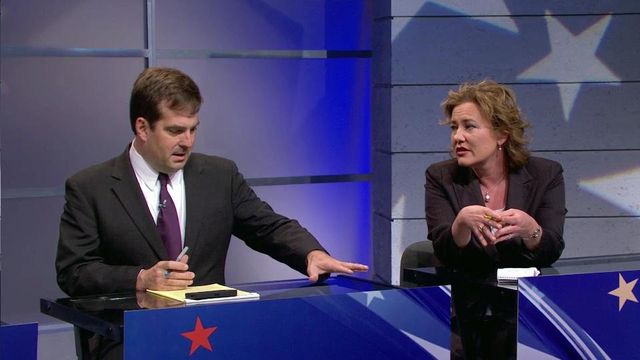Trailing GOP Senate candidates forge own path
The four Republicans widely seen as trailing in the eight-person field for the party's U.S. Senate nomination took advantage of their only shot at statewide exposure to lay out their case for why voters should pick them in the May 6 primary.
Posted — UpdatedFormer Shelby mayor Ted Alexander, Alex Bradshaw, a computer programmer from Icard, Edward Kryn, a retired doctor from Clayton, and Lexington lawyer Jim Snyder took part in a debate hosted by WRAL News that aired Saturday evening.
All four have registered support in the single digits in polls of likely voters, and none has done major fundraising to back his candidacy. That didn't prevent some candid observations from them during the 30-minute forum.
"As an open source developer, I know that you need to collaborate and cooperate to some extent to get things done," Bradshaw said. "I will try to not be dysfunctional."
"It's totally untenable to say that we're going to deport 12 million people," Snyder said when asked about dealing with illegal immigration. "We haven't done it, and we're not going to do it because we can't afford it."
Snyder espoused positions that other GOP candidates have refused to touch on the campaign trail, such as allowing people already in the U.S. illegally to remain as "permitted residents," limiting foreign military entanglements, such as the wars in Iraq and Afghanistan, as a way to reduce federal spending and paying attention to scientists who say human activities play a role in climate change.
Bradshaw proposed handling children in the U.S. illegally differently than adults, noting children more easily assimilate into American society. He also suggested performing a cost-benefit analysis to determine whether an adult was a net cost to the U.S. before deciding whether to deport him or her.
Kryn had a converse proposal, calling for people who had been deported and later re-entered the U.S. illegally to be charged for the cost of any public assistance they received before their deportation.
All four candidates backed repealing the Affordable Care Act, but they were less vocal when asked for their plans on a substitute for it.
"Except for (coverage for) pre-existing conditions, the care plan we had in effect was perfectly appropriate," Snyder said, discounting the number of people who lacked health coverage before the law took effect.
Bradshaw and Kryn both said the law addressed insurance and not health care, and Kryn and Alexander called for malpractice reform, allowing insurance plans to be sold nationwide instead of state-by-state and increased use of health savings accounts.
Alexander kept to fairly mainstream Republican stances on subjects such as the Affordable Care Act, immigration – deportation and the use of E-Verify by businesses – and military pay – cut other federal spending to ensure soldiers are adequately paid.
"It's unconscionable, to me, that our military personnel would be on food stamps," he said. "We can't, I think give enough to our military personnel in terms of what they give to us. They are putting their lives on the line every single day."
Kryn put forward ideas that the tea party wing of the party has backed, such as abolishing the U.S. Department of Education and Department of Energy and returning the control of schools and energy production to the states. He also blamed climate change on everything from sun spots to volcanoes.
Bradshaw suggested building walls to deal with rising sea levels and shifting to alternative forms of energy as possible ways to address climate change.
In the end, each candidate made a sincere appeal to voters as why he would be the best option to face Democratic U.S. Sen. Kay Hagan in the November general election.
"I love America, and I want to save the soul of America," said Kryn, a native of Canada and a naturalized U.S. citizen.
"I am the candidate that you can trust, that has the experience and that has the sheer determination to go to Washington to get things done," Alexander said. "My goal is to be that public servant."
"A lot of people say they want the most electable candidate to beat Kay Hagan, but the four front-runners are the most unelectable candidates of the bunch," Bradshaw said. "We need conservative leaders who can outflank the enemy, go to ground and wage guerrilla warfare and not just wage frontal assaults on every issue."
"I have a vision for an America that is so bold that no one could doubt her, so good that no one could hate her, so rich that no one could buy her and so strong that no one would ever try her," Snyder said. "I have a vision for an America that's like a city set on a hill – a light and beacon for all the world to see – but we're not going to see that unless you vote correctly."
The other four Republican Senate candidates – state House Speaker Thom Tillis, Dr. Greg Brannon of Cary, Rev. Mark Harris of Charlotte and Wilkesboro nurse Heather Grant – participated in two televised debates last week and have a third scheduled for Monday.
• Credits
Copyright 2024 by Capitol Broadcasting Company. All rights reserved. This material may not be published, broadcast, rewritten or redistributed.






